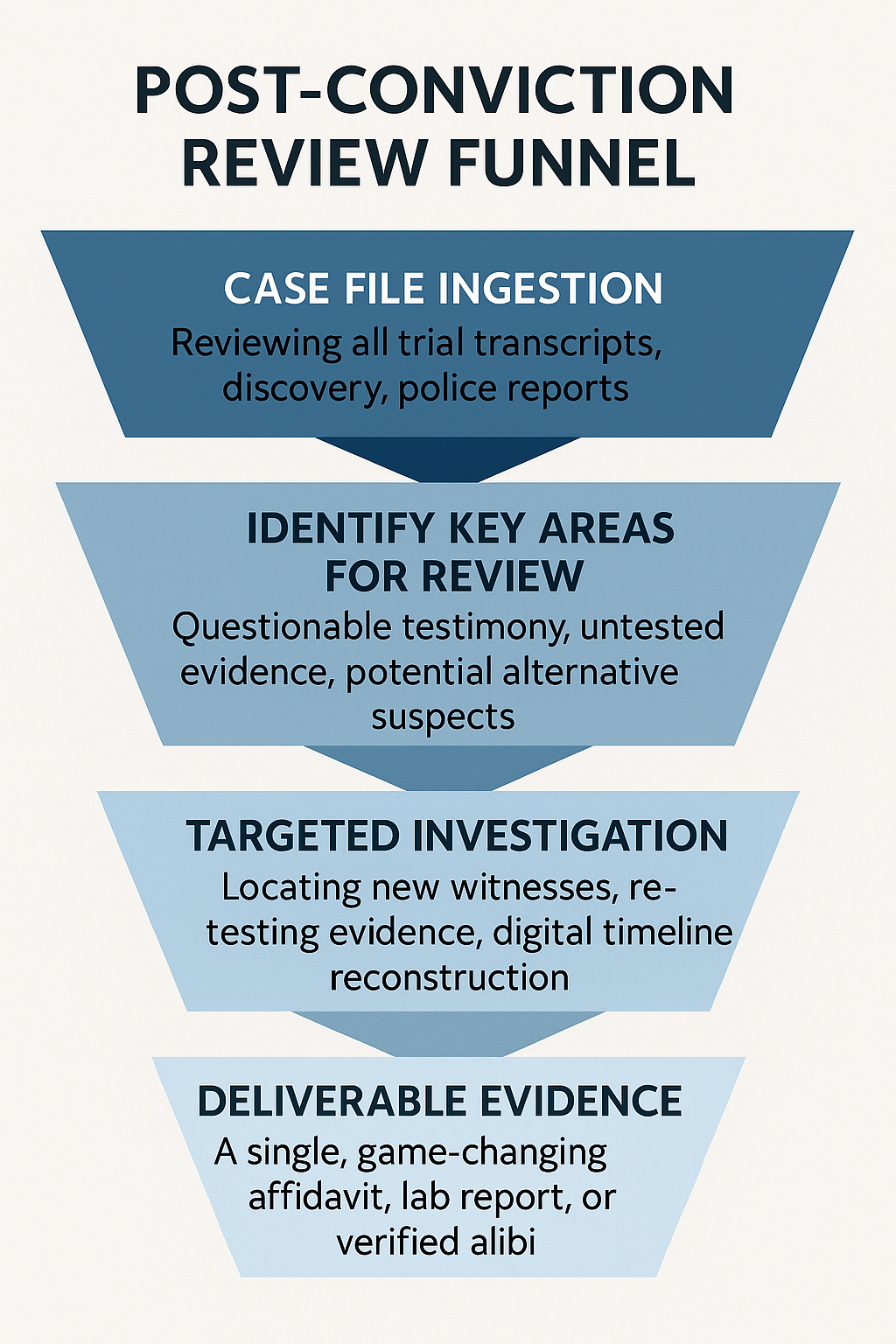For decades, too many defendants have faced the full investigative power of the state while relying on overworked public defenders and thinly stretched resources. That imbalance breeds error. Post-conviction investigation restores Investigative Equity—applying elite-level technology and relentless legwork to cases where the original search for truth fell short. The National Registry of Exonerations has logged over 3,500 exonerations since 1989, totaling more than 31,000 lost years of freedom [1]. DNA breakthroughs grab headlines, but many wins hinge on gum-shoe persistence courts rarely spotlight. At F3 Investigations, we partner with defense attorneys, innocence projects, and civil-rights firms to revisit cold evidence and expose cracks in “airtight” cases.
Uncovering New Witnesses—Years Later
 Witness intimidation fades with time. We revisit neighborhoods armed with new mapping tools and trauma-informed interview techniques, encouraging reluctant witnesses to speak. In one 2024 exoneration, a delivery driver missing from the original file placed our client miles from the crime scene, triggering DNA retesting and release [2].
Witness intimidation fades with time. We revisit neighborhoods armed with new mapping tools and trauma-informed interview techniques, encouraging reluctant witnesses to speak. In one 2024 exoneration, a delivery driver missing from the original file placed our client miles from the crime scene, triggering DNA retesting and release [2].
Re-testing Physical Evidence with 2025 Tech
Probabilistic genotyping now extracts usable DNA from mixed or degraded samples smaller than a pinhead [3]. When fresh analysis excludes a client, evidentiary dominoes fall fast.
Digital Timelines & Metadata Audits
Smartphones, CCTV, and IoT devices silently record alibis. Structured metadata charts reduced retrial times by 26 percent in NIJ trials [4].
Impeaching Faulty Forensics
We compile lab-error rates, retraction notices, and updated discipline standards to undercut outdated expert testimony—think shaken-baby claims or early DNA mixtures [5].
Thorough Background on Alternative Suspects
A fleeting “Person B” in police notes gets our full OSINT work-up—social posts, geofence data, and criminal ties—often exposing leads the original case missed.
A Strategic Partnership with Counsel
We act as an extension of the legal team:
- Initial Strategy Session — We sit with counsel to map case theory, flag the conviction’s weak points, and align an investigative plan with upcoming motions.
- Evidence for Motions — Our work targets the filings that matter: post-conviction DNA requests, Brady/ Giglio claims, ineffective-counsel briefs, and more.
- Regular Reporting — Secure-portal updates keep attorneys synced in real time, ready to pivot strategy the moment new facts surface.
Managing the Human Element
Clients fighting wrongful convictions endure unique trauma—lost years, strained families, public skepticism. Transparent communication and trauma-aware interviews keep hope grounded in facts, not false expectations.
Success Snapshot: “Project Southbound”
A 1997 robbery-murder hinged on two eyewitness IDs that later crumbled. We found an out-of-state trucker whose logbooks and vintage dash-cam tapes showed a different suspect vehicle. Touch-DNA on the pistol grip matched a felon in CODIS, excluding our client. After 28 years, the conviction was vacated and charges dismissed.
Why Chain of Custody Still Rules
Courts welcome new science only if evidence handling is pristine. Every digital capture is write-blocked and SHA-256 hashed; physical items ride in tamper-evident containers with temperature logs. We never give the opposition a chain-of-custody opening.
How We Can Help
Whether you seek a post-conviction review, need new witnesses interviewed, or must rebuild a digital timeline, our blend of cutting-edge forensics and relentless fieldwork levels the playing field. From siblings advocating for a loved one to attorneys prepping a habeas brief, we deliver the Investigative Equity every justice-reform case deserves.
Reference List
- National Registry of Exonerations. “Exonerations in the United States 1989–2025.” https://www.law.umich.edu/special/exoneration
- Innocence Project. “Witness Recantation and the Role of Post-Conviction Investigation” (2024). https://www.innocenceproject.org
- Probabilistic Genotyping Consortium. “Validation Study of STRmix v4 on Degraded DNA Samples” (2025). https://www.pgconsortium.org
- National Institute of Justice. “Impact of Digital Metadata on Post-Conviction Review” (2024). https://nij.ojp.gov
- American Academy of Forensic Sciences. “Reassessment of Legacy Forensic Techniques: A 2025 Update.” https://www.aafs.org